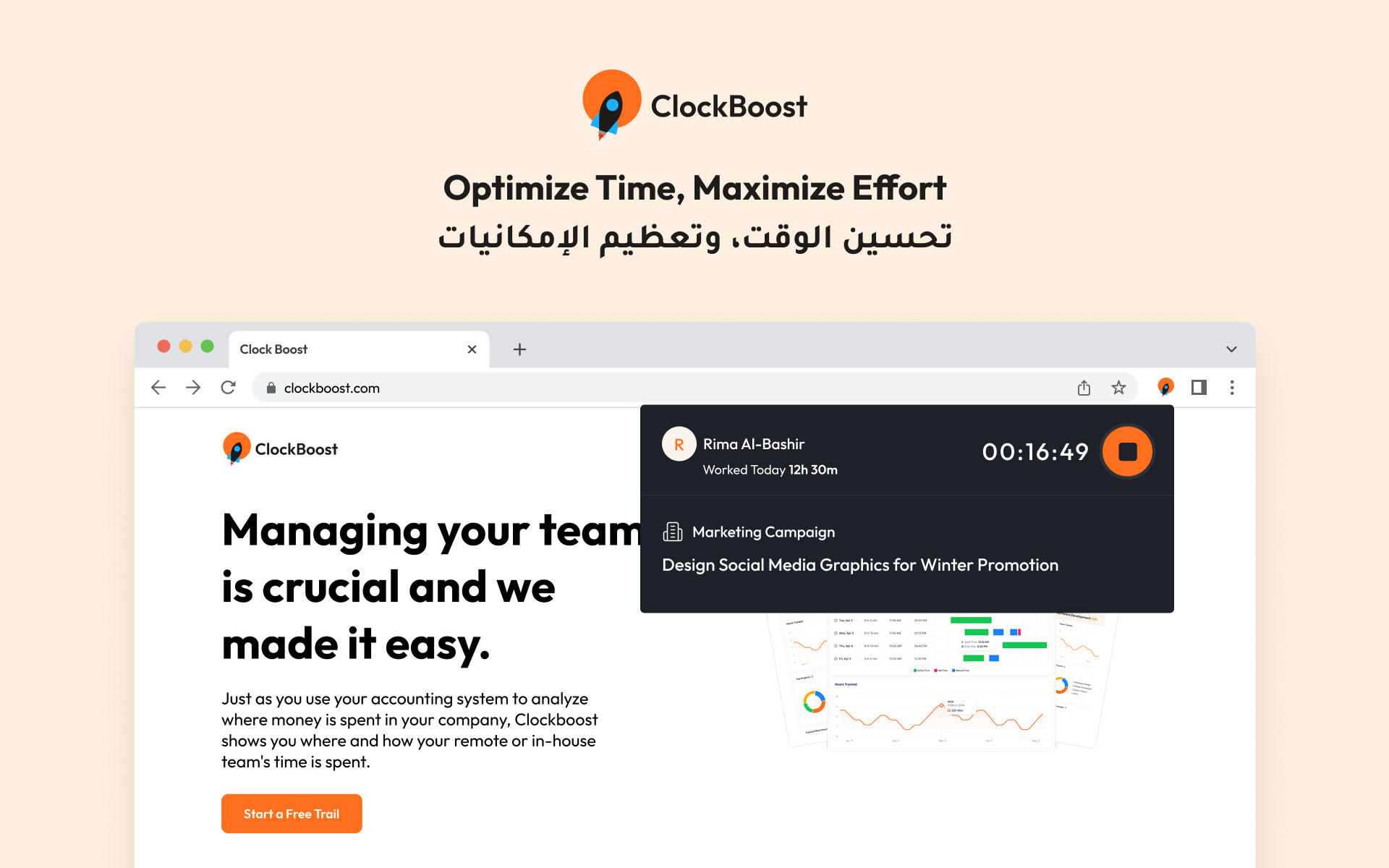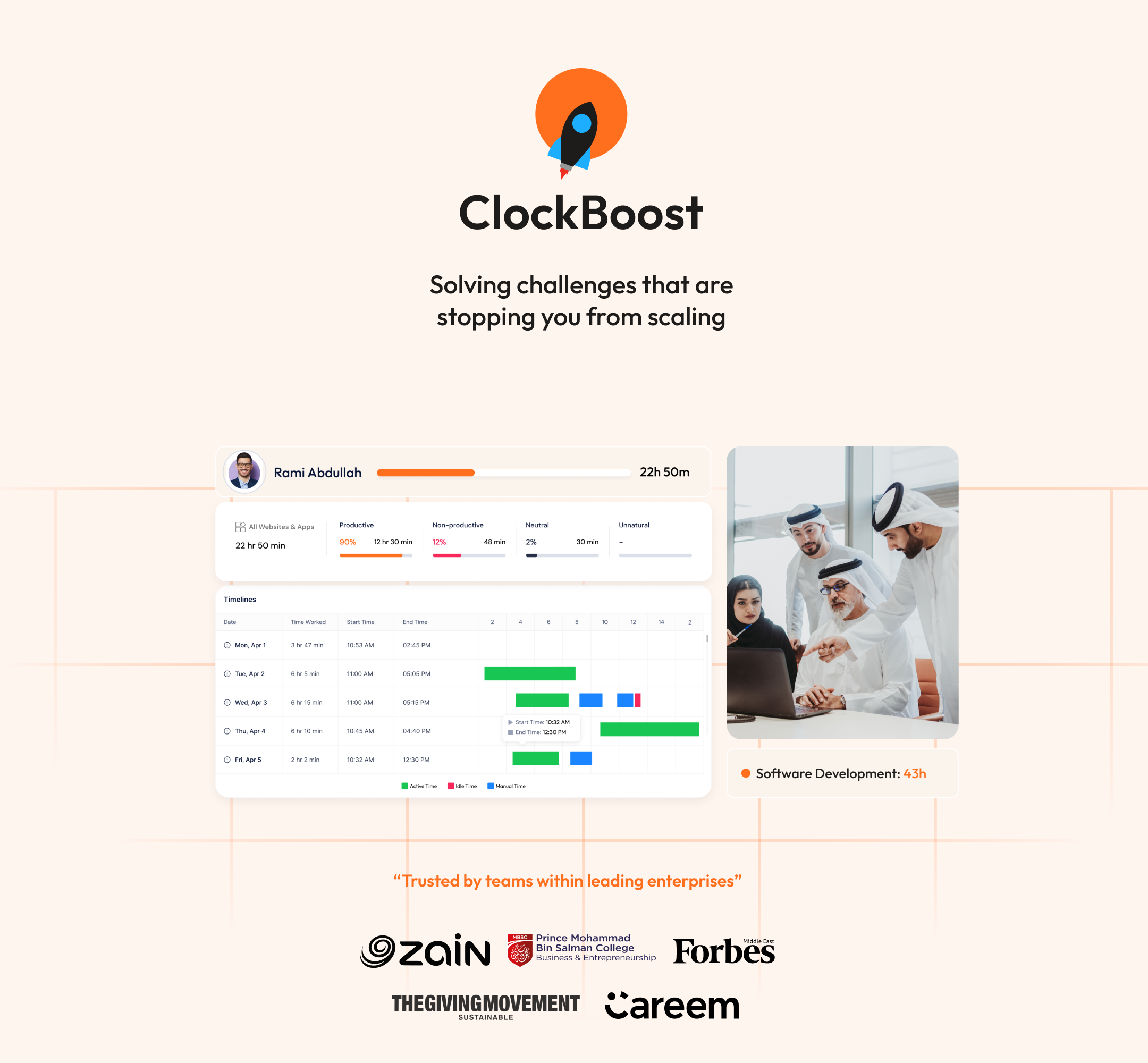
5 Time Tracking Myths That Hurt Gulf Tech Teams
Time tracking often gets a bad rap. In many Gulf tech companies, it's associated with micromanagement, employee mistrust, or rigid systems better suited for freelancers. But in 2025, these assumptions are not only outdated, they're actively holding teams back.
Modern, strategic time tracking isn’t about watching people work. It’s about creating visibility, balance, and insight—especially in remote and hybrid setups where structure matters more than ever.
Let’s bust five of the most common myths we hear from Gulf-based HR managers, startup founders, and operations leaders—and show how tools like ClockBoost are flipping the narrative.
Myth 1 – “Time Tracking Is Just Micromanagement”
This is the biggest myth and the most damaging. Many assume time tracking equals surveillance. But modern tools like ClockBoost give teams more autonomy, not less.
ClockBoost allows for:
- Role-based optional screenshots, not blanket surveillance.
- Private activity logs that employees can review themselves.
- Transparent policies, aligned with PDPL and regional privacy expectations.
Micromanagement isn’t about the tool; it’s about intent. ClockBoost helps managers lead through insight, not oversight.
Myth 2 – “It’s Only for Billing or Freelancers”
Historically, time tracking was used to bill hours. Today? It’s about spotting inefficiencies, aligning work to goals, and supporting deep focus.
For Gulf-based product, engineering, and support teams, ClockBoost:
- Categorizes time across tools (Jira, GitHub, ClickUp, etc.)
- Highlights idle patterns and distractions
- Surfaces team-level focus trends without naming and shaming
The result? Leaders can redesign workflows, rebalance teams, and prioritize high-value work.
Myth 3 – “It Destroys Team Trust”
The opposite is true if the tool is introduced correctly. Gulf teams value clarity and fairness. With the right communication, time tracking builds trust.
ClockBoost is:
- Privacy-first by design (PCI, SSL, PDPL-compliant)
- Customizable per team or department
- Transparent in what’s tracked and what’s not
By giving employees visibility into their own data and focusing on team, not the individual, metrics, ClockBoost becomes a trust-building tool.
Myth 4 – “It Slows Down Agile Teams”
Some believe time tracking adds friction to fast-moving teams. In truth, it removes it.
Agile Gulf teams use ClockBoost to:
- Spot blockers in dev or support workflows
- See when context-switching kills deep work
- Run retros with real productivity insights not vague impressions
Data doesn’t slow you down; it shows you where to speed up.
Myth 5 – “Gulf Teams Don’t Need It”
We’ve heard this one a lot: "Remote work in the Gulf is still new we’re not there yet."
But here’s what’s changed:
- Hybrid models are becoming permanent (UAE, KSA, Kuwait)
- Teams are distributed across time zones
- The 4-day work week is on the rise (see Dubai’s government pilot)
Time visibility is no longer optional. It’s the key to making flexible models work—without sacrificing performance or culture.
ClockBoost is designed to:
- Work in Arabic and English
- Handle flexible schedules (split shifts, async blocks, etc.)
- Keep data compliant across Gulf jurisdictions
The ClockBoost Difference – Built for Gulf Realities
ClockBoost isn’t a one-size-fits-all platform. It was built with Gulf-region teams in mind:
- AI-powered summaries, not manual timesheets
- KPI dashboards to track what really matters
- Integration with regional workflows (Google Workspace, Trello, Jira, etc.)
- 3-month free trial, no credit card required
It’s time tracking that respects your team and your culture.
Conclusion: Bust the Myths, Build the Future
Time tracking isn’t broken, it’s just misunderstood. And for Gulf tech leaders building remote and hybrid cultures, the opportunity is clear:
- Replace myths with clarity.
- Replace fear with transparency.
- Replace control with empowerment.
With ClockBoost, your team doesn’t just log time. They understand it, optimize it, and own it.
Sources:


























.png)

